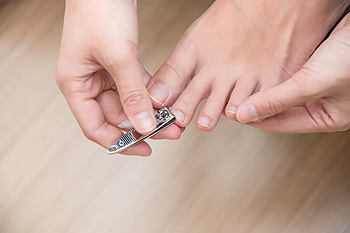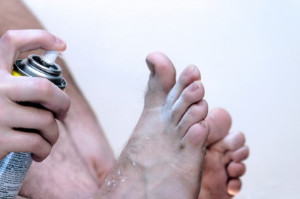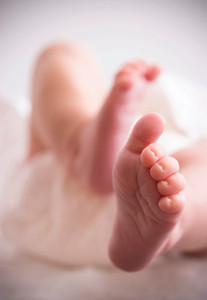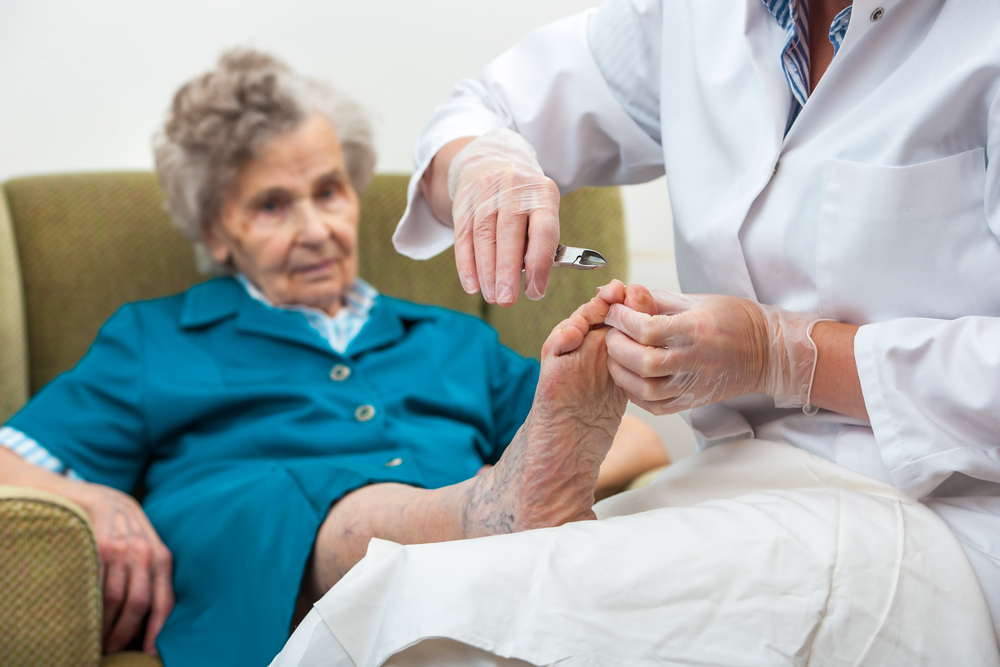
 When the feet are properly cared for on a daily basis, certain foot conditions may be prevented from occurring. Athlete’s foot may be avoided when the feet are washed and thoroughly dried daily, especially between the toes. When a good moisturizer is applied, it may help to prevent cracked heels from developing. The importance of trimming the toenails properly is necessary in possibly preventing the painful condition known as ingrown toenails. Additionally, the feet will feel more comfortable when the correct size shoe is worn, and this can be accomplished if shoes are tried on in the afternoon when the feet are their largest. If you would like additional information about how to maintain proper foot care, it is advised to seek the counsel of a podiatrist.
When the feet are properly cared for on a daily basis, certain foot conditions may be prevented from occurring. Athlete’s foot may be avoided when the feet are washed and thoroughly dried daily, especially between the toes. When a good moisturizer is applied, it may help to prevent cracked heels from developing. The importance of trimming the toenails properly is necessary in possibly preventing the painful condition known as ingrown toenails. Additionally, the feet will feel more comfortable when the correct size shoe is worn, and this can be accomplished if shoes are tried on in the afternoon when the feet are their largest. If you would like additional information about how to maintain proper foot care, it is advised to seek the counsel of a podiatrist.
Everyday foot care is very important to prevent infection and other foot ailments. If you need your feet checked, contact the podiatrists from The Foot & Ankle Center of New Jersey. Our doctors can provide the care you need to keep you pain-free and on your feet.
Everyday Foot Care
Often, people take care of their bodies, face and hair more so than they do for their feet. But the feet are a very important aspect of our bodies, and one that we should pay more attention to. Without our feet, we would not be able to perform most daily tasks.
It is best to check your feet regularly to make sure there are no new bruises or cuts that you may not have noticed before. For dry feet, moisturizer can easily be a remedy and can be applied as often as necessary to the affected areas. Wearing shoes that fit well can also help you maintain good foot health, as well as making it easier to walk and do daily activities without the stress or pain of ill-fitting shoes, high heels, or even flip flops. Wearing clean socks with closed shoes is important to ensure that sweat and bacteria do not accumulate within the shoe. Clean socks help to prevent Athlete’s foot, fungi problems, bad odors, and can absorb sweat.
If you have any questions please feel free to contact our office located in Ridgewood, NJ . We offer the newest diagnostic and treatment technologies for all your foot and ankle needs.
 Athlete’s foot is a common fungal infection. A majority of athlete’s foot cases are caused by fungi that thrive in closed, warm, and moist environments. The fungi feed on Keratin, which is a protein found in the hair, nails, and skin. Athlete’s foot is mildly contagious and can spread through direct contact with the infection and by skin particles left on towels, shoes, or floors. Walking barefoot can increase the chances of contracting athlete’s foot. The risk can also go up depending on your susceptibility. People who have impaired immune systems or diabetes are at greater risk for infection if they have an open cut or sore on their foot. If you have developed athlete’s foot or feel that you may be at risk, it is advised that you consult with a podiatrist.
Athlete’s foot is a common fungal infection. A majority of athlete’s foot cases are caused by fungi that thrive in closed, warm, and moist environments. The fungi feed on Keratin, which is a protein found in the hair, nails, and skin. Athlete’s foot is mildly contagious and can spread through direct contact with the infection and by skin particles left on towels, shoes, or floors. Walking barefoot can increase the chances of contracting athlete’s foot. The risk can also go up depending on your susceptibility. People who have impaired immune systems or diabetes are at greater risk for infection if they have an open cut or sore on their foot. If you have developed athlete’s foot or feel that you may be at risk, it is advised that you consult with a podiatrist.
Athlete’s foot is an inconvenient condition that can be easily reduced with the proper treatment. If you have any concerns about your feet and ankles, contact the podiatrists from The Foot & Ankle Center of New Jersey. Our doctors will treat your foot and ankle needs.
Athlete’s Foot: The Sole Story
Athlete's foot, also known as tinea pedis, can be an extremely contagious foot infection. It is commonly contracted in public changing areas and bathrooms, dormitory style living quarters, around locker rooms and public swimming pools, or anywhere your feet often come into contact with other people.
Solutions to Combat Athlete’s Foot
Athlete’s foot can cause many irritating symptoms such as dry and flaking skin, itching, and redness. Some more severe symptoms can include bleeding and cracked skin, intense itching and burning, and even pain when walking. In the worst cases, Athlete’s foot can cause blistering as well. Speak to your podiatrist for a better understanding of the different causes of Athlete’s foot, as well as help in determining which treatment options are best for you.
If you have any questions please feel free to contact our office located in Ridgewood, NJ . We offer the newest diagnostic and treatment technologies for all your foot and ankle needs.
 The medical condition that is referred to as tarsal tunnel syndrome, or TTS, can cause pain and discomfort on the inside of the ankle. It often occurs as a result of nerve damage, which may lead to inflammation. Patients who run or exercise for extended periods of time may gradually experience this type of nerve damage, or it may come from enduring a traumatic injury. Mild relief may be felt by gently stretching the surrounding muscles and tendons, in addition to resting and elevating the affected ankle. This may help to diminish a portion of the swelling. In severe cases, taping the ankle or wearing a brace may provide adequate support as the ankle heals. If you feel you have this condition, it is suggested to consult with a podiatrist who can offer the correct treatment options for you.
The medical condition that is referred to as tarsal tunnel syndrome, or TTS, can cause pain and discomfort on the inside of the ankle. It often occurs as a result of nerve damage, which may lead to inflammation. Patients who run or exercise for extended periods of time may gradually experience this type of nerve damage, or it may come from enduring a traumatic injury. Mild relief may be felt by gently stretching the surrounding muscles and tendons, in addition to resting and elevating the affected ankle. This may help to diminish a portion of the swelling. In severe cases, taping the ankle or wearing a brace may provide adequate support as the ankle heals. If you feel you have this condition, it is suggested to consult with a podiatrist who can offer the correct treatment options for you.
Tarsal tunnel syndrome can be very uncomfortable to live with. If you are experiencing tarsal tunnel syndrome, contact the podiatrists of The Foot & Ankle Center of New Jersey. Our doctors can provide the care you need to keep you pain-free and on your feet.
Tarsal Tunnel Syndrome
Tarsal tunnel syndrome, which can also be called tibial nerve dysfunction, is an uncommon condition of misfiring peripheral nerves in the foot. The tibial nerve is the peripheral nerve in the leg responsible for sensation and movement of the foot and calf muscles. In tarsal tunnel syndrome, the tibial nerve is damaged, causing problems with movement and feeling in the foot of the affected leg.
Common Cause of Tarsal Tunnel Syndrome
The Effects of Tarsal Tunnel Syndrome
A physical exam of the leg can help identify the presence of tarsal tunnel syndrome. Medical tests, such as a nerve biopsy, are also used to diagnose the condition. Patients may receive physical therapy and prescriptive medication. In extreme cases, some may require surgery.
If you have any questions please feel free to contact our office located in Ridgewood, NJ . We offer the newest diagnostic and treatment technologies for all your foot and ankle needs.
 Research has indicated that most babies are born with flat feet. This is typically the result of muscles, tendons, and ligaments that have not fully developed yet. When the child starts to walk, it is encouraged to walk barefoot while indoors. The toes will grasp the floor naturally, and this is beneficial in strengthening the entire foot. When walking begins, the foot should be properly measured so the correct size shoe can be determined. It is important for the soles to be flexible, in addition to confirming there is adequate room for the toes to move freely in. Some children will walk with their toes pointing inward or outward. If this pertains to your child, it is suggested to consult with a podiatrist who can properly examine your child’s feet.
Research has indicated that most babies are born with flat feet. This is typically the result of muscles, tendons, and ligaments that have not fully developed yet. When the child starts to walk, it is encouraged to walk barefoot while indoors. The toes will grasp the floor naturally, and this is beneficial in strengthening the entire foot. When walking begins, the foot should be properly measured so the correct size shoe can be determined. It is important for the soles to be flexible, in addition to confirming there is adequate room for the toes to move freely in. Some children will walk with their toes pointing inward or outward. If this pertains to your child, it is suggested to consult with a podiatrist who can properly examine your child’s feet.
Making sure that your children maintain good foot health is very important as they grow. If you have any questions, contact the podiatrists of The Foot & Ankle Center of New Jersey. Our doctors can provide the care you need to keep you pain-free and on your feet.
Keeping Children's Feet Healthy
Having healthy feet during childhood can help prevent medical problems later in life, namely in the back and legs. As children grow, their feet require different types of care. Here are some things to consider...
Although babies do not walk yet, it is still very important to take care of their feet.
Avoid putting tight shoes or socks on his or her feet.
Allow the baby to stretch and kick his or her feet to feel comfortable.
As a toddler, kids are now on the move and begin to develop differently. At this age, toddlers are getting a feel for walking, so don’t be alarmed if your toddler is unsteady or ‘walks funny’.
As your child gets older, it is important to teach them how to take care of their feet.
Show them proper hygiene to prevent infections such as fungus.
Be watchful for any pain or injury.
Have all injuries checked by a doctor as soon as possible.
Comfortable, protective shoes should always be worn, especially at play.
If you have any questions please feel free to contact our office located in Ridgewood, NJ . We offer the newest diagnostic and treatment technologies for all your foot and ankle needs.
 Diabetic patients may develop serious foot conditions as a result of elevated blood sugar levels. Some people experience neuropathy. Symptoms of this ailment often include a numbing or tingling sensation, and it may be painful to walk. Additionally, it can be difficult to feel any cuts or irritations on the feet, and this may lead to the formation of diabetic foot ulcers. This occurs when the cuts become infected, and if not promptly treated, gangrene may develop. People who are diabetic often notice changes in the feet. These consist of swelling, ingrown toenails, extremely dry skin, and temperature changes. If there are open wounds, it is suggested to keep the area covered and dry, and it may be beneficial to wear a supportive boot. Diabetic patients are urged to be under the care of a podiatrist who can properly treat any foot condition that is associated with diabetes.
Diabetic patients may develop serious foot conditions as a result of elevated blood sugar levels. Some people experience neuropathy. Symptoms of this ailment often include a numbing or tingling sensation, and it may be painful to walk. Additionally, it can be difficult to feel any cuts or irritations on the feet, and this may lead to the formation of diabetic foot ulcers. This occurs when the cuts become infected, and if not promptly treated, gangrene may develop. People who are diabetic often notice changes in the feet. These consist of swelling, ingrown toenails, extremely dry skin, and temperature changes. If there are open wounds, it is suggested to keep the area covered and dry, and it may be beneficial to wear a supportive boot. Diabetic patients are urged to be under the care of a podiatrist who can properly treat any foot condition that is associated with diabetes.
Diabetic foot care is important in preventing foot ailments such as ulcers. If you are suffering from diabetes or have any other concerns about your feet, contact the podiatrists from The Foot & Ankle Center of New Jersey. Our doctors can provide the care you need to keep you pain-free and on your feet.
Diabetic Foot Care
Diabetes affects millions of people every year. The condition can damage blood vessels in many parts of the body, especially the feet. Because of this, taking care of your feet is essential if you have diabetes, and having a podiatrist help monitor your foot health is highly recommended.
The Importance of Caring for Your Feet
Patients with diabetes should have their doctor monitor their blood levels, as blood sugar levels play such a huge role in diabetic care. Monitoring these levels on a regular basis is highly advised.
It is always best to inform your healthcare professional of any concerns you may have regarding your feet, especially for diabetic patients. Early treatment and routine foot examinations are keys to maintaining proper health, especially because severe complications can arise if proper treatment is not applied.
If you have any questions please feel free to contact our office located in Ridgewood, NJ . We offer the newest diagnostic and treatment technologies for all your foot and ankle needs.